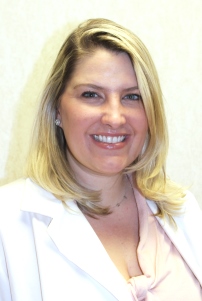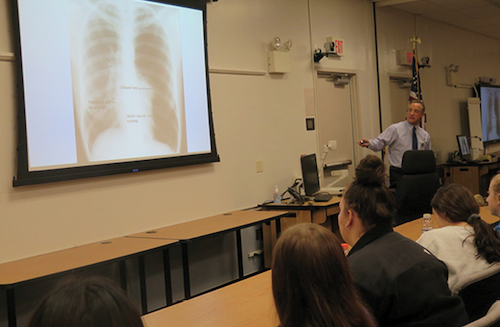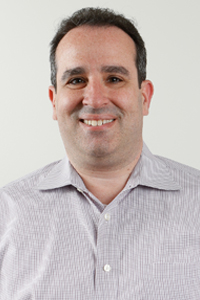Robotic and Minimally Invasive Surgery
Skilled in all aspects of laparoscopic and minimally invasive urologic techniques, the Good Samaritan Hospital physicians employ the state-of-the-art Da Vinci robotic interface for prostatic, adrenal, kidney, and bladder surgery.
Prostate Cancer Treatment and Screening
The Good Samaritan Hospital physicians are experts in cancer care with broad experience in the newest therapies for cancer of the prostate, kidney, bladder and other genito-urinary organs. Available treatments include nerve-sparing prostatectomy, seed implantation, cryosurgery, bladder replacement, and complex surgery for kidney cancer with vein involvement. Recently, Good Samaritan Hospital's, Dr. Dixon has been working in the area of MRI/Ultrasound Fusion-guided prostate biopsy techniques and state-of-the-art minimally invasive targeted ablation for localized prostate cancer.
- Fusion-guided Prostate Biopsy
- The KOELIS Trinity® Fusion-Guided MRI combines a specialized magnetic resonance imaging (MRI) scan with an ultrasound image to precisely target the area of the prostate to be biopsied, leading to fast and more accurate diagnosis and treatment plans.
- TrueBeam Linear Accelerator
- The new TrueBeam™ Linear Accelerator system is an advanced radiotherapy technology for treating cancer.
- Opening up treatment options for people with cancer, it targets tumors with accuracy measured in millimeters. With its power and flexibility, clinicians can develop treatments that are best suited for patients’ individual circumstances.
- SpaceOAR Hydrogel
- The SpaceOAR® Hydrogel procedure is available. This technology reduces radiation side effects during prostate cancer treatment. To improve patient outcomes and enhance their quality of life after treatment, Good Samaritan Hospital has added an innovative new technology called SpaceOAR® hydrogel to our prostate cancer treatment capabilities.
- SpaceOAR® hydrogel is a gel-like material that temporarily moves the rectal wall away from the prostate during radiation therapy. The process is minimally invasive, remains stable during radiation therapy and then is gradually absorbed by the body after radiation therapy has been completed. The gel’s placement reduces the amount of radiation that the patient’s rectum receives during prostate treatments, which spares healthy tissue and can reduce complications associated with radiation therapy.
- Clinical trials have demonstrated that use of the SpaceOAR® rectal spacer in conjunction with curative radiation therapy results in:
- 66 percent improvement in bowel related quality of life
- 65 percent improvement in bladder related quality of life
- 78 percent increase in likelihood of preserved erectile function in patients with adequate pre-treatment function.
Personal Urology and Radiation Oncology Support through Program Coordinator

Danielle Hansen, RN, OCN
The program also offers a dedicated, clinically trained, Urology and Radiation Oncology Coordinator to guide patients through their treatment course. Danielle Hansen, RN, OCN is a board-certified oncology registered nurse.
Every patient is different, with their own needs, questions and concerns. That’s why we take such care in personally leading patients through our entire process—from initial tests and follow-up care to emotional support—the Coordinator is here.
Danielle educates and counsels patients about their diagnosis, treatment options available, while also referring them to the appropriate support services and community resources. She acts as the central contact to help patients move smoothly through the healthcare system and receive the highest standard of care in a timely manner.
Endourology and Stone Disease / Stone Treatments
Simple and complex stone disorders are treated surgically with laser, robotic, and out-patient sonic lithotripsy - all minimally invasive techniques.
Incontinence Care and Women's Health
The Good Samaritan Hospital Incontinence Care Division offers diagnostic and therapeutic procedures for urinary incontinence and bladder control for males and females. We also offer specialized care for patients with neurological disease, including spine injury or stroke. Reconstructive surgery is available to correct vaginal prolapse and urethral penile disease.
Male Infertility and Sexual Center Infertility and Male Sexual Dysfunction
The Good Samaritan Hospital Urology Department treats all aspects of treatment for male infertility and sexual dysfunction. We offer vasectomy reversal and microscopic varicocele surgery, penile prosthesis implants and in-office vasectomy.
News and Media
January 11, 2024
If you’ve ever had a urinary tract infection, you know how unpleasant it can be. Explore practical tips to reduce your chances of contracting a UTI. Read.
September 12, 2023
Attention: fathers, grandfathers, uncles, sons and brothers … and the women who love them: How is prostate cancer diagnosed and treated? Learn about the latest innovations from Mitchell Fraiman, MD, and Ross Bauer, MD, urologists at Good Samaritan Hospital, on WRCR Radio's "House Calls."
June 13, 2023
Prostate cancer is the second-leading cause of cancer death for American men. In fact, about one in every eight men will be diagnosed with prostate cancer during their lifetime, according to the American Cancer Society. While prostate cancer is a serious condition, it’s very treatable when caught in its early stages. Here’s what you should know about prostate cancer screening and why it’s so important. Read.
September 22, 2022
Richard Evans, MD, urologist and Administrative Director of Robotic Surgery, was interviewed on WTBQ Radio's weekly talk show, “Health Matters,” about early detection and treatment of preventable diseases including, prostate and thyroid cancer and other men’s health issues.
June 30, 2022
Listen to “Health Matters” on WTBQ Radio with urologist Richard Evans, MD, Administrative Director of Robotic Surgery at Bon Secours Charity Health System, a member of the Westchester Medical Center Health Network. He encourages early detection and treatment of preventable diseases including, prostate cancer, heart disease and other men’s health issues. When you can see physicians close to home, it’s easier to stay current on your routine health care.
March 31, 2022
Listen to “Health Matters” on WTBQ Radio with urologist Dr. Richard Evans, Administrative Director of Robotic Surgery at Bon Secours Charity Health System, a member of the Westchester Medical Center Health Network. He discusses robotic surgery, bloodless medicine, kidney conditions and men’s health issues.
Dr. Evans Teaching
Read about Dr. Richard Evans, Administrative Director, Robotic Surgery, Director, Bloodless Medicine Surgery Program, Bon Secours Charity Health System, and Clinical Assistant Professor, New York Medical College, who was featured in the July issue of the American Urological Association’s AUA News International Journal for his continued commitment to educating high schoolers in Rockland, Orange and Nassau Counties through Mini Medical School. Read more.

Listen to House Calls with Mitchell Fraiman, MD, Medical Director, Urology, Good Samaritan Hospital, Suffern, NY and Christopher Dixon, MD, Urologist at Good Samaritan Hospital as they discuss prostate health, urologic conditions and treatment options.
Hear From Our Experts and Urology Patients
Hear from a Urologist Near You

Mitchell Fraiman, MD, Medical Director, Urology, Good Samaritan Hospital, Suffern, NY
Q: What made you decide to become a urologist - why is the field fascinating to you?
A: Urology is a unique field of medicine which incorporates all aspects of clinical care (medical therapy, surgical therapy, psychotherapy). The urologic patient also presents with everything from emergency issues requiring acute care to chronic issues which require annual follow up. Each day is different and the diversity of cases keeps me intellectually very stimulated.
Also, during my medical school years I helped my grandfather battle metastatic prostate cancer. He fought a very courageous battle. Ultimately, he lost his battle and I lost the patriarch of my family. I believe that my subconscious directed me to the field of urology to help others fight the very disease that devastated me by killing my grandfather, who I loved dearly.
Q: What is something that medical school doesn't teach you?
A: Medical school teaches us the science behind the practice of medicine. Medical school doesn’t teach us that every decision and every interaction we have with our patients is potentially life changing. The human being is cared for in many ways which are not directly related to the science which we are taught. Often times, listening to the patient is the most therapeutic part of the care we provide.
Q: You have been awarded numerous patients’ choice and compassionate doctor awards, why do you think the relationship between patient and provider is so important?
A: I have learned from personal experience, as a patient myself, that the relationship between patient and caregiver is paramount in healing. Unfortunately, I have personally encountered many cold/sterile interactions with health care providers. I try to engage my patients to understand them as a whole. The physician needs to understand the patients complaints, ailments and issues. Care cannot be effective unless the patient and the doctor understand each other. Why treatment is needed, along with the various treatment options, needs to be explained and understood. Patients should always be given the opportunity to question our treatment plans. I try to spend as much time is needed so that my patients feel that I am engaged and part of their “team.” I am honored daily to be trusted by my patients.
Q: How does being fluent in Spanish help you engage with your patients?
A: I have studied Spanish at every level of my education. I started in public school in NJ and then continued my studies at Boston University. At every point in my medical life I have used Spanish (medical school, residency, private practice, hospital work). Communication is a huge part of our medical practice. I have used Spanish as much as possible to improve my skills. My ability to care for Spanish-speaking patients is enhanced greatly by being able to use their native language. My ability to communicate in Spanish is not perfect however it does allow me to communicate much more effectively and allows me to create a better bond with my Hispanic patients.
Q: Is there anything else you'd like me to know about your specialty or your work?
A: I have joined Good Samaritan with the goal of providing: state of the art, complete urologic care, in a compassionate and caring environment. I am surrounded by amazing partners – Dr. Christopher Dixon and Dr. Ross Bauer. Their commitment to the same goal, is paramount to our successes. In addition, I am supported by experts in the fields of oncology, radiation therapy, surgery, medicine, critical care, pathology, and radiology.
Q: Kidney stones are a very common ailment for people, are there any recent advances in the treatment of kidney stones?
A: Kidney stone treatment has evolved in recent years so that open surgery is almost never needed to clear our patients stones. The stones are often times cleared by using special scopes which we can guide into the kidneys along with lasers that break up the stones. The laser fibers we use are only microns in size. Alternatively stones can be broken with special sound waves which are focused on the stones to break them apart (shock wave lithotripsy).
The largest stones, which used to require open surgery, are now approached with special telescopes which we pass into the kidneys via a tract created between the skin and the inside of the kidney. Using special instruments these stones are broken up and physical extracted from the kidney under direct vision. This allows us to leave patients “stone free.”
Hear from Our Urology Patients

A Revolutionary Way to Treat a Prostate Condition

Physicians at Good Samaritan Hospital use steam to kill benign prostate cells and improve urinary function.
By David Levine
As seen in the May/June 2019 issue of Advancing Care
About five years ago, Michael Davis noticed that it was taking longer and longer to empty his bladder. “It’s like when your wife drives over the garden hose – it takes forever to water the garden,” jokes the 68-year-old Nanuet resident. “I also had to get up more often during the night.”
A condition known as benign prostatic hyperplasia (BPH), or an enlarged prostate, is the most common prostate problem for men over 50, including Davis. His difficulty urinating was caused by two things that commonly happen as men age: The prostate enlarges, and the bladder wall thickens. As the prostate grows, it presses against and pinches the urethra. The bladder eventually may weaken and become unable to empty completely. These factors make urination difficult.
Davis, who has owned a dental equipment sales and service company for 27 years, has been treated for years by Mitchell Fraiman, MD, Director of the Division of Urology at Good Samaritan Hospital, a member of the Westchester Medical Center Health Network (WMCHealth). Medication is a common treatment for BPH, but it didn’t work well for Davis.
“His symptoms progressed despite the medications he was on,” Dr. Fraiman says. Surgery is another possible treatment for BPH, but it can present its own complications.
Luckily, a revolutionary new treatment option at Good Samaritan Hospital gave Davis relief.
Rezum (as in resume) is a minimally invasive procedure that uses steam, rather than surgery, to treat BPH. “The steam kills the benign cells; the tissue atrophies; and in a few weeks, the symptoms get better,” he explains.
Davis was all for giving it a try, especially after Dr. Fraiman showed him images of his enlarged prostate and constricted urethra. “It really did look like a car sitting on a garden hose,” Davis says. “It was all smooshed.”

Michael Davis, pictured here at The Capitol Theatre in Port Chester, is an avid concertgoer who is back to enjoying live performances in his spare time.
The treatment for Davis consisted of six injections of steam, each lasting nine seconds. “The whole thing took 54 seconds. He was sedated for only five minutes,” Dr. Fraiman says.
The treatment was a success, though improvement was not seen immediately. The steam causes the tissue to swell for a few weeks before it dies off. Davis needed to use a catheter for a few days after treatment. “At first I was reluctant to urinate. I was really careful. After about one month, I knew there was a difference,” says Davis, who lives with his longtime partner, Shelley Smith. They have a combined five children and will soon welcome their eighth grandchild.
Three months after the Rezum therapy, all his symptoms were gone, and he was able to stop his prostate medications. “Rezum has revolutionized the treatment of BPH,” Dr. Fraiman says. “It’s now the favored procedure in my practice.” He adds that studies are underway to see if Rezum can treat cancerous growths.
Like all men, Davis’ prostate will grow as he ages, and there is a small chance he will need to be retreated. “In four to five years, the retreatment rate is 4.4 percent,” says Dr. Fraiman. In the meantime, Davis will have a clinical exam and routine testing once a year.
Davis has a lot going on in his life. “I am what I call a one-man fire department,” he says. “I get a call, go to the emergency, put out the fire and go back and wash the truck,” all the while overseeing the care of Smith, who is in declining health. During his rare free time, Davis enjoys seeing performances of his favorite local bands.
He recommends the Rezum treatment to anyone suffering from urinary difficulties due to BPH. “I may not feel like I’m 23, but I do feel like I’m 33, and that’s OK,” he says. “It was absolutely worth it.”
What Our Patients are Saying
“I absolutely love the physicians and nursing staff at Good Samaritan Hospital [and Bon Secours Urology.] Dr. Fraiman who heads up the urology division has been my doctor for about 10 years and he’s grown and prospered moving to Good Samaritan Hospital. The bedside manner, medical knowledge and informative tools to best aid patients in the understanding and utilization of resources relative to their condition sets them apart from the rest. I drive an hour every time I pass a kidney stone or have relative complications to see them because I know I am in the best hands possible and I have faith in all they do to help and heal.” - Nicole J.